Know your IELTS: an in-depth analysis of how to take the best preparation in IELTS exam; with tips, tricks, suggestions from previous candidates
Some of my students have appeared in the IELTS exam in recent days. When preparing for this exam, they came by a number of matters and talked to me about some important suggestions, tips, and tricks which, they think, should be shared with future IELTS candidates as they will come in handy if anybody wants to achieve a great overall band score. They shared with me their experiences of preparation, the problems they faced in different modules, and how they overcame them. This post aims at this issue and it will also help any IELTS candidate to take a strong and effective preparation in all four modules.

After listening attentively to at least 200 students from Asian and African regions around the world and judging carefully their ideas, viewpoints, and strategies, I’ve dissected the main problems of maximum students in two major parts. First, the approach they take in their prep (which is mostly a wrong one!), and second, the techniques or strategies they follow (which is also a wrong one). Let’s have a look at them in detail, shall we?
The wrong approaches to IELTS practice:
A great number of students regularly ask me why they get such poor scores on this exam though they have strong preparation. Is it? Was it really a great preparation? Were the approaches correct?
According to this little research on a number of students here in Asia and Africa, where English is not the native language, we found that it is our wrong approach towards the preparation for the IELTS test which is the greatest problem. Most students fail to coordinate the practice among all four skills, namely, listening, reading, writing, and speaking.
Take a close look at the following scenario:
Case study 1: An IELTS candidate has recently got introduced to the IELTS exam and needs to appear in the test after a couple of months. Having a very basic knowledge of the English Language and grammar, and receiving some poor advice from some friends and close ones, he/she plans to study only the Reading and Listening module as they seem to be harder than the others. He believes if he can prepare himself better in the Reading and Listening module, he can cover the Speaking and Writing module just 15 days before the exam. After the exam, his result is 5.0 or 5.5. He appears in the exam again after a month and his result is 6.0 in the second attempt.
Case study 2: Another IELTS candidate, who has had enough time before appearing in the IELTS exam, thinks of sitting for a mock test every other day before the final exam, though he has a serious lacking of understanding of the questions and instructions. After taking at least 20/25 mock tests and scoring 6.0-6.5 on average, when he appears on the final test IELTS, he scores 5.5. He attempts another exam the next month, and the result is only 6.0.
Now, if we look closely at the two given scenarios, we can find some interesting facts. In the first case, the student’s approach toward the exam is completely wrong one. Most IELTS candidates, with a great band like 7.0 and over, suggest that practices for all the modules should go hand in hand. This means a candidate should practice the Listening, Reading, Writing, and Speaking modules simultaneously. There has to be a routine approach in a disciplined way.
In countries, where English is not a native or official language, candidates face major difficulties in the Reading module. Most of the candidates are weak in Reading and their score continuously fluctuates here. So, it needs more attention than the other modules. For both the Writing and Speaking modules, candidates may follow some techniques which will make it easy for them to score better and give them more time to spend Reading and Listening. It has been also observed from studying some IELTS scores of many candidates that the scores of Writing and Speaking are more stable than Reading and Listening. So, to secure an overall band score, even though the result of Reading is a bit low, candidates need to focus more on Speaking and Writing.
As far as the second case is concerned, the strategy to practice has to be perfect. Otherwise, there will be no development in the final result. First, a candidate must learn about every type of Reading and listening question individually. Then, they should attempt the partial mock test, and then, complete the mock test. Doing everything together will result in confusion and it will take you nowhere.
Here, I would like to suggest some points. Please, do not expect much from the IELTS exam if you have a very weak background in the English language. You should not be disheartened by this. First, you need to improve yourself in the basics of the English language and grammar, which you can easily do with an expert in the English language. Try giving yourself enough time there; then you should think about taking the IELTS course.
Speaking:
For speaking you should take a compact preparation on the very recent topics. Nowadays, you can follow different blogs and websites on IELTS which provide the recent speaking topic cards collected from recent IELTS candidates. These are my suggestions which I’ve set for you all after having chats and discussions with some top scorers in the IELTS exam in 2018.
- Make a list of common speaking topics. Try to discover the trends in the topics. For example, look at the following topic cards;

Here, if you look closely, you can see that all the topic card titles are of the same trend/pattern; which is technology. Try to select such topics of your own; do not take the help of others. YOU CAN DO IT.
2. Now, arrange one or two answers (length: 2 minutes) that can cover all the topics. When you arrange them, try to focus on one or two technologies. Do this for all the topics. Don’t think about 7 ideas for 7 topics; this won’t take your preparation anywhere; rather it may get lengthy and boring. If you can arrange 30/35 different topics like this, you can cover around 250 topic cards.
Arrange your ideas on various topics before the actual exam. It is not possible to cover all the topics of the world, but somehow the topic card in the exam surely relates to something you already know. You may not have thought about it, but you know much about it. So, be ready with at least 250 topic cards and it is not impossible at all. You need to talk for around 2 minutes. A previous prep always helps you. For this preparation, you can always try doing some brainstorming which helps you not only on the topic you are practicing but also on some other topics. Here is an example of such a BRAINSTORMING idea:
Look at this topic card:
If I ask you about planning to talk about this topic, how will you do it? Probably it will become difficult for many of you to arrange it. Below is a plan that you can set, but remember that if you do not practice it regularly, you cannot do it in the exam hall.
A. Think about the topic and guess some ideas; it won’t be that easy at first, but after doing 9/10 topics, it will be easy for you to arrange.
B. Try to relate your ideas to the prompts of the cue card. Prompts are the 3/4 clues or questions given with the topic.
C. Here is a mind map that I’ve prepared for your assistance.
Does this picture help us? I think it does. What do you think?
Now, as you know, you will be given a pencil and a piece of paper and a very short time of 1 minute to take preparation on the topic, you must use it appropriately.
Here is a note that I’ve made; let’s see if it helps us:
Now, follow the link below and find the answer. Match whether the notes help you to talk for 2 minutes.
You must realize some points here in order to make the best use of the 1-minute time given for taking notes:
- a) You can only make the best use of the time if you practice note-taking.
- b) You need not be accurate in grammar.
- c) You need to focus on the questions/hints/points/prompts of the cue topic card.
- d) You never need to be authentic or realistic for providing any unknown info.
- e) You should not write a sentence; write only the key points.
You can talk outside the notes that you have taken, but don’t go too far; that may affect your speaking.
- If you have already arranged around 50/60 topics, you can concentrate on vocabulary, grammar, and pronunciation. Your presentation becomes graceful and lucid when you use complex vocabulary and different sentence patterns with clear pronunciation.
- The best speaking prep can be taken by selecting a fluent speaker of English who can guide you, trace and show your faults, and most importantly, help you correct your mistakes. To do this, you can join an English Language institution where an IELTS course is offered and an expert trainer is available. Be sure about the qualification of your trainer. You should also look for a partner speaker who will assist you until your exam.
- The last thing I can mention here is to be aware of the first impression. You have to score well in the PART 1 section of the Speaking Test. So, answers to general questions such as yourself, the meaning of your name, your family, education, work, pastime activities, hobbies and interests, dislikes, sports, exercise, daily life, aim in life, the reason for taking IELTS exam, food, culture, travel, and tourism should be prepared well by you. You must convey to the examiner/interviewer that you are not an average person to be considered or marked poorly. So, be prepared to make the best impression in part 1.
Writing:
In recent times many IELTS candidates scored poorly in the Writing Module. When asked the reason, many of them stated that they did not have much idea about all the Task 1 and Task 2 topics; and as a result, they failed to recognize the pictures or essays in the exam. Moreover, many of the candidates mentioned that they thought that writing would be easy for them to cover because they had been writing since their childhood. However, the exam scenario was quite different and they messed up arranging their ideas and failed to provide a sound and logical answer.
Here are my suggestions based on the inquiries I have made talking to some candidates:
- Know all the types of questions you may face in both Task 1 and Task 2. Learn the differences and similarities among all the question types.
For instance, Academic Task 1 asks you to write a minimum 150-word report on the given picture or pictures. They can be graphs, charts, tables, diagrams, maps, or flow-charts. You may have one graph; but who says that you won’t get mixed graphs or charts? How about getting 4 pictures? So, you must learn about these differences and similarities.
Look at these pictures and identify the similarities and differences.

Click here to get a great model answer for this cycle diagram.
- The same goes for General Training Task 1 where you are asked to write a letter in no less than 150 words. There are different types of letters in both informal and formal situations. You may be asked to write an official complaint, a letter to get some information, a letter of apology, or even an informal letter to a close one.
Look at the following letter samples:
Find a great model answer for the above-given sample here in this link.
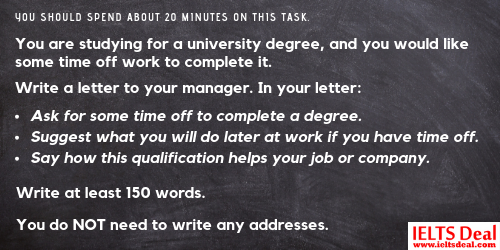

Find a great model answer for the above-given sample here in this link.
Try to guess if you have to write all these letters in the same way or not. The answer will be ‘NO’. All these letters are different from one another. So, you need to learn about the differences.
This is also applicable to Task 2 essays.
There are several types and the structures of writing them are also quite different.
Here are some samples from which you can try to find out the differences.
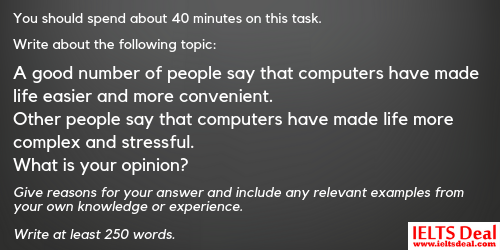
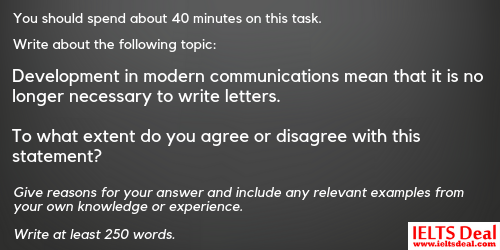
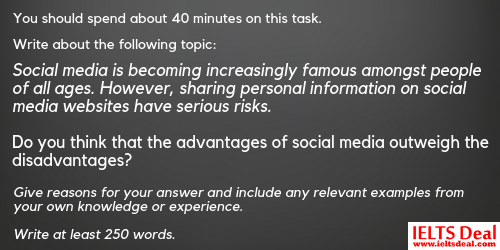
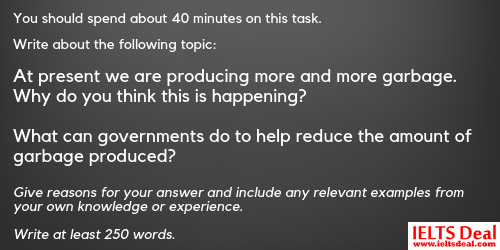
Click here for an excellent model answer for this problem-solution essay
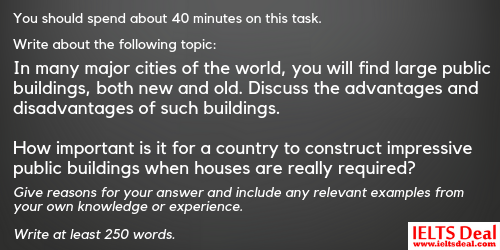

Click here for a great model answer for this essay.
- Learn the structures and grammar usage. They can be different according to the pictures and you need to know how to use different sentence patterns for them.
- Set a target to write at least 2/3 samples for each task. Then compare them with your partners or fellow learners to evaluate each other. Finally, show them to your tutor who will check, correct, and grade them. This is absolutely important and you must learn from the mistakes you have made and try not to repeat the mistakes.
- Sometimes it may take you more than a month to prepare and become an excellent writer. So, DO NOT RUSH, please. Be patient and give plenty of time to yourself.
- If you face problems in writing on your own, follow any top-rated IELTS-based website or blog and follow their advice. You can follow any great website or blog.
- However, NEVER follow any fixed writing FORMAT of writing. Your writing won’t be graded correctly if you follow any specific or memorized format. Be careful not to do this mistake. Learn some common grammatical terms and usage and then try to write on your own. You can follow my method of 3SS or PAW.
3 = Three
S = Simple
S = Steps
Or,
P = Plan your writing
A = Arrange paragraphing
W = Write
Listening:
If you have this habit of listening to English songs, watching BBC, CNN, or Fox News, listening to podcasts, or watching English movies, Listening should not be a big deal. As you know, there are 4 sections in this test, and every section gets progressively harder, you are in need of practice and getting used to pronunciation and accent.
Here are a few suggestions from my part:
- There are many websites where you can appear in the Listening tests online and you will be marked automatically. Even you have the clarifications for wrong answers. Try one or two tests and you will get what I mean.
- When you appear in a mock test, personally arranged or online, whatever the case is, please try to appear in a full test and then check your score, correct your mistakes, and, using the explanations, learn why you have done the mistakes and try not to do these mistakes again.
- After the end of the first section, you are given 30 seconds to check the answers that you have written in the listening question booklet. In my opinion, you should skip it and go to section 2 to read ahead. Do this for Sections 3 and 4 as well. This will give you extra 30 seconds to read ahead, which can be crucial for the test.
- Often in multiple-choice questions, information from all the options are told by the speakers which make the candidates nervous and they make mistake by choosing the wrong answers. You need to be careful about the use of antonyms, negatives, or any word which may make a contradiction with the correct answer. Improve your vocabulary power or lexical resource for this. Thus you can identify the difference between ‘I often do it’ and ‘I seldom do it’. Be careful about spelling mistakes too. You can try memorizing some common word lists which appear often in the Listening Test.
Reading:
Probably the most frustrating part of IELTS for nearly all non-native learners or candidates is the Reading Module. This exam covers almost 2200-3000 words in total and the passages in the later stages get more complicated.
For this section, I have some special suggestions which may help you if you do it according to my instruction. These have helped me to achieve a great band in IELTS Reading Test and I hope they do the same for you too. Ready for my suggestions:
- First, familiarize yourself with different Reading articles. You must build up a habit of reading English texts every day. It may be from a book, a newspaper, or a magazine; even it can be a short advertisement-based text from your local store. READ, READ, and READ. Only then you can go for the test.
- Learn synonyms, antonyms, and key phrases which appear commonly in the Reading test. They can be found online on different blogs and websites.
- Try to do some speed reading. It means to read two, three, or four lines, in some cases, a whole paragraph at a stretch. Make a note of how long it takes you to complete a text of, say, 1000 words, and how much you have understood it.
- Try to make a summary of some news reports, short articles, etc. This will improve your power of getting the gist or general idea.
- Always remember that you won’t be given any subject or topic that is not clearly explained in the text. If you still don’t get the meaning of a complex word or idea, probably you’ve missed it. Look for definitions or explanations, look for words and phrases like ‘refer to’, ‘explains’, ‘consists of’, ‘i.e.’ (Latin: id est – means), etc.
- Learn about all the questions types of the Reading Test. DO NOT start a mock test unless you learn all the question types. Most importantly, learn each question type separately and do some practice to check it.
- Appear in short tests and try to focus on one reading passage first. When you see some improvement, you can move on to appear in all the complete mock tests. Be sure to check the answers, and correct the wrong answers from the explanations.
Many people would suggest that practicing from Cambridge IELTS series books does not help much. I, however, disagree and think that any book with some reading practices will help you. After all, you need to read some texts for Reading Tests.
Some general suggestions or tips:
* Practice whatever you feel is essential for your preparation but be sure not to waste your valuable time. If you have zero skills in English, IELTS is not for you, yet. Improve your basics and then go for it.
* For every module, do some relevant practices. It’s no use doing some writing for the Listening Test.
* Take necessary help from YouTube, IELTS websites, and blogs. They really help!
* Be in contact with an expert in the English language all the time. You need him/her for understanding whether you are doing right or wrong. “In a treacherous road, you lose the way without a guide”.
* Don’t be shy to share your mistakes with fellow candidates; it will rather make you more confused. Feel free to accept that you are not the best and that a mistake can be made. You need to learn from your mistakes, and you need to learn quickly if you have less time, that’s all!
Has this post helped you in your IELTS preparation? If so, please leave a comment explaining how this guideline has helped you. You can also ask questions on any IELTS related matters.










